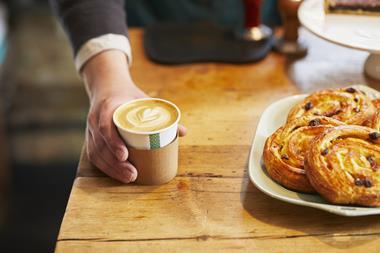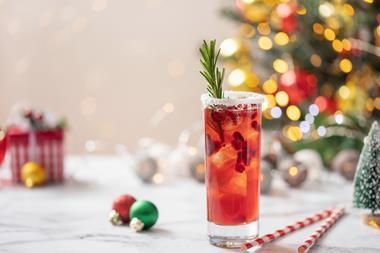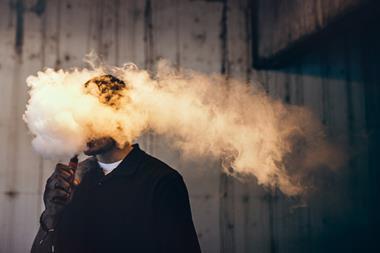Find the balance between old favourites, lower-sugar formulations and new health-giving drinks, and you’ll see your soft drinks sales sparkle.
It may not feel like it yet, but it honestly is springtime, and soon we should see some more sun, and with it plenty of soft drink sales.
As a key element of on-the-go sales, soft drinks are a great generator of footfall and can be a handy way to increase basket spend. What’s more, thanks to the category’s steady year-on-year sales and some game-changing legislation, the range within this category is growing fast.
Iris Penney, of The Store, Badminton in Gloucestershire, says it’s more than the warmer weather that is increasing the popularity of soft drinks in her store at the moment.
“Spring is a good time for soft drinks sales because of the number of tradesman that come in the store. After the winter everyone is springing into action and getting their driveways and work done, and the builders and tradesmen will buy a lot of the snacking items and soft drinks.”
Not all retailers will see the same trend but, on a wider note, soft drinks increased sales by 2.2% to be worth £3.1bn in the convenience channel in 2015, according to the 2016 Britvic Soft Drinks Review. This was particularly impressive considering that the total soft drinks market contracted by 0.6%.
According to Nielsen, soft drinks have shown growth across top-up, on-the-go, take-home and single-serve. Thanks to its positive performance within convenience in 2015, soft drinks grew to become just as important as bread (HIM Research & Consulting) and was ranked the number-one category bought for a food-to-go mission.
The category owes much of its success to water – the Britvic Soft Drinks Review shows 99% of soft drinks growth in convenience was driven by water, water plus, energy and iced tea and coffee.
Flavoured water brand Perfectly Clear recently added a new range of premium, sparkling flavoured waters. The Clear Sensation range is available in a 500ml bottle format and consists of four flavours: lemon & mint; strawberry & raspberry; pomegranate & blueberry; and apple & pear.
Each drink is made with natural spring water, contains zero sugar, uses natural flavours and contains two-thirds of the daily guideline amount of key vitamins.
Raj Aggarwal, who owns three Spar stores in Leicestershire and Sheffield, sees strong water sales and says sales of soft drinks generally are increasing.
“Water has seen a big increase and fruit-flavoured Volvic water is doing really well, which I think is because people are being a bit more health conscious.”
Bay Bashir, of Belle Vue Convenience Store, Middlesbrough, agrees. “A lot more people are looking for healthy options like flavoured water, rather than the fizzy drinks. Perfectly Clear is doing well.
“Volvic is probably a must-have brand. I always ensure that when a brand is doing well that I stock their whole range,” he adds.
Donna Pisani, trade communications manager at Coca-Cola Enterprises (CCE), says: “Both flavoured and plain bottled water have increased in popularity, driven by those looking for rehydration while on the go and an increased consumer demand for healthier products.
“The plain bottled water sector is worth £736.2m (Nielsen) and among the best performers was Glaceau Smartwater, which became the number five immediate consumption water brand less than a year after its launch within the independent retail channel.”
Nigel Paine, GB commercial director out-of-home at Britvic, says: “Thanks to its positive performance within convenience in 2015, soft drinks was ranked the number one category bought for a ‘food-to-go’ mission, ahead of other impulse categories such as snacks, crisps, confectionery and sandwiches (HIM). This highlights just how pivotal soft drinks were within the convenience channel and what a crucial sales driver they became for retailers in 2015.”
Daniel Lee, supervisor at Tates Spar St Neots in Cambridgeshire, agrees this category is essential for c-stores. “It is an important category for us because it’s part of the lunch occasion and that’s a big part of c-store sales. It’s particularly important for our store because we are near offices, schools and close to the train station, so a lot of people come in on their lunch breaks or for on-the-go consumption.”
Bitter sweet
The move to healthier soft drinks looks like it will continue apace thanks to the forthcoming tax on sugary drinks, set to come into force in 2018. It will mean soft drinks companies will add about 8p to a can of sugary fizzy drink.
According to Kantar, 92% of consumers are actively trying to reduce their sugar intake and HIM has reported that 49% of c-store shoppers said in 2015 that having ‘healthy options’ is important.
CBL Drinks sales and marketing director Maurice Newton believes the UK is a nation “newly-obsessed with our health”. “Today’s clued-up consumer is becoming increasingly concerned with healthier food and drink options,” he says.
Juice with less sugar
Last month saw the official launch to the UK of Newton’s Appl Fizzics, a sparkling juice drink created by ex-managing director of Coca Cola UK Chris Banks.
He says: “Juice and juice drinks have been a key theme in the mainstream drinks sector, principally due to the sugar content and its impact on the well-being of children and adults alike. With consumers becoming more sugar savvy and studying the ingredient declarations more rigorously, Newton’s Appl Fizzics has launched at a timely moment. It is a great drink for consumers who want to enjoy juices, but are conscious of high-sugar content in many drinks.”
Available in both 330ml and 750ml bottles, Newton’s Appl Fizzics contains 40% less sugar than apple juice alone. The drink contains apple juice and sparkling water and has no artificial ingredients, preservatives or added sugar.
Banks adds: “The lightly sparkling, golden drink is perfect for adults and children alike,” says Banks. “The perfect serve is chilled straight from the fridge and can be enjoyed from the bottle, or poured into a glass with ice.”
Britvic says the good news is that the low-calorie segment benefitted from this trend, achieving 4.1% growth to £567m, versus full-sugar soft drinks which grew by 1.7% to £2.5bn in convenience.
“The war on sugar is one of the key issues being faced by food and drink manufacturers and retailers,” says Dean White, one of the founders of a new ‘healthy’ soft drinks range, Hey Like Wow, which contains only natural flavourings and water.
“As consumers, we were frustrated by the soft drinks brands which promote themselves as healthy, yet in reality are anything but. It was clear to us that radical innovation was needed.”
Several new brands have been created in the wake of the announcement about the sugar tax, with the ambition to provide full ranges of ‘healthy’ drinks.
GB Drinks was launched last year by former chef Gary Barnshaw, and supported by Olympic medallist and BBC sports commentator Steve Cram CBE. Barnshaw says: “Health issues and changing lifestyles have influenced shifts in UK consumption of soft drinks in the past few years. From the outset, our pledge has been to develop drinks that help retailers tap into the ‘wellness revolution’, from innovative fruit and dairy shakes that contain very low sugar and high levels of calcium and vitamins, and botanical extracts designed to help consumers relax, refresh and revitalise.
“What is key for convenience stores striving to meet demand for healthier products is our promise to add no sugar to our ranges and develop products with category-leading, low amounts of natural sugars such as fructose and sucrose.”
GB Drinks has introduced a new KOJI range (rrp £1.89 per 330ml carton), which includes crushed fruit, coconut water and botanical extracts. It also launched Djuiced Fruitshake for kids this spring (rrp £2.99 for a pack of four 180ml Tetra bottles). The brand says its blends of real fruit juice and milk contain far less sugar than the typical juices and smoothies on the market.
As well as having a name with clear health connotations, Feel Good’s range of 750ml sparkling juice drinks tie in with the current trend for healthier drinking as they are being marketed as a blend of pure fruit juice and sparkling water.
Big brands have been working hard to get in on the act and reformulate with less sugar. Lucozade Ribena Suntory plans to reduce calories by 20% per 100ml across its portfolio. Ribena Light has expanded its portfolio of no-added sugar products with the launch of Ribena Light pineapple & passionfruit, with just 10 calories per 250ml.
The brand says the drink has already emerged as the top-performing product across the entire Ribena Light range. 2016 will see the introduction of a new £6m marketing campaign to drive awareness of its Ribena Light range.
More recently, the brand has launched new Ribena Very Berry 500ml drink which combines blackberries, raspberries and strawberries, but 30% of the calories from sugar have been removed and stevia sweeteners have been added.
Other brands have followed suit. Spar UK has removed 51.6 tonnes of sugar and 206m calories from its soft drinks range. As part of the refresh to the range, it has rebranded its American Cola to Classic Cola, and reduced its sugar content by 10%.
Spar retailer Edward White, in Calver, Derbyshire, says the move should benefit him and other retailers. “I imagine this will be a very positive move for Spar retailers. It’s definitely a big thing in the time we are living in now. Cutting back on sugar is something everyone is aware of and we are always looking to stock low-sugar items,” he says.
Eurospar retailer Gregory Cochrane, who has two stores in Kilkeel, County Down, says the full range of Spar brand drinks sells well as they are included in the sandwich and drink for a £3 meal deal offer.
“It’s especially important to stock low-sugar soft drinks because they are popular with children, and it’s important to educate children about sugar and how it affects health,” Gregory says.
Spar has also revamped its successful Blue Bear energy drink range, with a new look as well as a 10% reduction in sugar.
Coca-Cola has followed suit. “CCE’s range of flavoured carbonates includes Fanta, Dr Pepper, Lilt and Sprite, and in line with the ongoing debate on sugar each brand offers a variant containing zero sugar and calories,” says CCE’s Donna Pisani. “In addition, Sprite, together with raspberry and passionfruit Fanta, are produced with a blend of stevia leaf extract and sugar, increasing the choice for those wishing to reduce their sugar intake while still enjoying a naturally-sweetened product.
CCE has also reduced the sugar content of Coca-Cola Life further so that it now contains 45% less sugar and calories than regular colas. A 330ml can of Coca-Cola Life will now contain 76 calories and 19 grams of sugar. Says Pisani: “The flavoured carbonates sector is worth £668.3m. Retailers can boost their sales by offering a full range, including lower- and zero-sugar variants of well-loved brands.”
Get a flavour for milk
Mars Chocolate Drinks and Treats says the flavoured milk market is continuing to grow, with value sales increasing by 2.2% over the past year to be worth £297m (IRI). Chocolate milk remains the category’s favourite flavour with a 32% share, followed by fruit (24%) and specialised flavoured milks (22%).
While the chocolate milk market shows an overall decline of 2.5%, Mars Milk says it is bucking this trend, with a value sales growth of 15.4% (IRI).
The sub-category showing the most growth (19.6%) is specialised milk, which accounts for £64.6m of total value sales. Mars Chocolate Drinks and Treats introduced Mars High Protein and Snickers High Protein milk drinks (rrp £2) last year, each containing 22g of protein.
Last month the firm added Mars No Added Sugar to its 350ml milk drinks range, extending choice.
“Our varied product range, including the 350ml and 750ml drink sizes, has broad appeal – whether a shopper is looking for a treat on the go, or shopping to take home for later,” says Mars Milk general manager Michelle Frost.
Iced coffee is super cool
“The biggest growth area for us has been cold coffee”, says David Wyatt, of Costcutter service station in Copthorne, West Sussex.
A new iced coffee brand has been created to offer Japanese-inspired naturally sweet and smooth brews.
NOMI (rrp £10 for three 250ml bottles) is made with 100% natural ingredients, with no preservatives, colourings or sweeteners and is ethically sourced. Cold brew coffee makes the flavour naturally sweet so it can be consumed at room temperature or over ice, without any added sugar or sweeteners, the company says.
The word ‘Nomi’ is translated from Japanese ‘to drink’ and the drink is influenced by the Japanese city of Kyoto, where many its old coffee shops serve cold coffee made from Guatemalan Huehuetango beans.
Nomi Tokyo Black has 10 calories, containing 100% coffee; Nomi Kyoto Iced has 85 calories, with 55% coffee; and 45% full-fat British milk, and Nomi Osaka Almond has 95 calories, with 60% coffee and 40% cold pressed almond milk.
The products are made from single-origin coffee kept for more than 16 hours in cold filtered water to steep, and coffee beans have been filtered three times for clarity.
Old favourites
While it is important to make room for healthier options, there is no denying that standard variants of big brand soft drinks are still very much in demand. David Wyatt, of Costcutter service station in Copthorne, West Sussex, says that despite a lot of innovation within the category, one of the best sellers in his store is still Coca-Cola.
Daniel agrees and says the store uses the product’s popularity as a simple way to increase basket spend. “The original Coca-Cola is the most popular drink by far. We also have a dump bin of grab-and-go bottles which used to be £1 PMPs, but we are moving over to non-pricemarked bottles which will be about £1.59.”
CCE’s operational marketing director Caroline Cater says the brand has also benefitted from the fact that a fifth of adults now opt not to drink alcohol. The government has reassessed its recommended limits on alcohol consumption, which has impacted the soft drinks market.
According to Pisani, adult special soft drinks is worth £214.8m and was one of the fastest growing sectors last year.
Amanda Grabham, SHS Drinks marketing director, whose portfolio includes Shloer, says there’s no doubt that increasing numbers of consumers are switching to soft drinks as an alternative to alcohol. “More than one in five adults (21%) don’t drink alcohol at all, and 40% of women either don’t drink alcohol, or are trying to cut down,” she says.
“Consumers are turning to adult soft drinks because they want flavours which are alternatives to wine and are more suited and attuned to the adult palate. That’s why flavours such as grape, elderflower and pomegranate are so popular, and why you are seeing growth coming from exotic flavour combinations such as mango & coconut.”
Tapping into this trend, some firms have rebranded their products to make them look more sophisticated and appealing to adults.
This month Schweppes 1ltr mixers have new black labels which demonstrate the brand’s long-standing heritage as the ‘creator of bubbles since 1783’. The modern new design is also peppered with adult wit and humour to appeal to 30-plus consumers looking for intriguing brands that suit their lifestyles.
Schweppes is supporting the packaging revamp with lifestyle POS, cinema advertising and a digital campaign – showcasing that shoppers can get the perfect serve using Schweppes products.
Britvic has unveiled a complete relaunch of its popular juice drink Drench, aimed at adult consumers looking for more sophisticated soft drink choices,
The refresh of the brand will see new 500ml packaging with a modern design. The new and improved recipe will include no artificial sweeteners, colours or flavourings. The liquid has been reformulated to contain less sugar and the launch is being supported by a £2m consumer campaign.
David says he is looking to expand his adult soft drinks range by adding some Fentimans lines.
“They have a more premium price, but they are really nice and they stock a really good wide range, which I think will appeal to a different market,” says David. “It’s good to offer a product which is a bit different.”
Pisani points out that shoppers are more interested in diversity, adding that people are “increasingly looking for innovation in both pack formats and range of flavours”.
Old Jamaica is now selling a new Guava & Melon Crush variant, 7UP has recently revealed a sugar-free Mojito flavour and Levi Roots, which says the tropical flavoured carbonates sector is growing at 3% year on year, has launched its new Carnival Flava – with peach and papaya (£1 PMP per 500ml).
Purity Soft Drinks has added a host of new products to its portfolio with the acquisition of premium natural drinks firm Firefly Tonics. The Firefly range now boasts redesigned packaging with brighter colours, botanical drawings and a new logo.
In addition, a 400ml PET range will replace the 500ml pack size in order to appeal more to consumers on the go. Products are available in a wide variety of tropical flavours: peach & green tea; lemon, lime & ginger; pomegranate & elderflower; kiwi, lime and mint; grapefruit & passionfruit and Bramley apple & ginger.
The range of sugar-free and ‘healthy’ products is clearly growing in variety and popularity, so retailers should ensure to give plenty of space to these. However, don’t forget about the old faithfuls such as Coca-Cola, which are standing strong through the trend.
Appealing to the convenience shopper
Coca-Cola Enterprises has these key tips for making the most of soft drinks sales:
Get your range right. Look to best-selling soft drinks that are being backed by big marketing investments, and make sure you offer a range of variants and pack formats
Keep your soft drinks cold. Last summer’s immediate consumption growth proved that people are looking for instant refreshment from a cold drink during hot spells
Stay up to date with innovation. New products, variants or packaging formats are an ideal way to achieve incremental growth
Focus on big events. Be aware of big occasions where friends and family will gather together, such as popular TV shows or sporting events, as these provide a key opportunity to drive sales
Ensure your soft drinks fixture is easy to shop. Group different sectors together – for example, colas, flavours, energy drinks, waters, juice and juice drinks – and store your best-sellers in the most prominent display locations
Stock pricemarked packs (PMPs). Shoppers are always looking for value for money and convenience stores are in the ideal position to use PMPs as a tool for growing sales
Group soft drinks with complementary items. Display soft drinks alongside other products that are popular for nights in, such as accompanying snacks or confectionery, or include them as part of a meal deal
Stock the right pack sizes. Larger bottles are generally less appealing over the summer period, but sales of 500ml bottle formats generally increase during the summer months.
Source
Nikki Cutler


























No comments yet